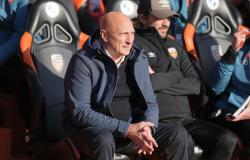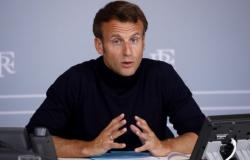(Damascus) American diplomats arrived in Syria on Friday to meet the new authorities, dominated by radical Islamists, with the aim of encouraging them to reunify the country after 13 years of a bloody civil war.
Posted at 6:23 a.m.
Layal ABOU RAHAL
Agence France-Presse
The fall of Bashar al-Assad on December 8 put an end to half a century of undivided rule by the Assad clan and repression, but raises multiple doubts about respect for human rights, the situation of minorities in a country deeply fragmented and the future of the semi-autonomous Kurdish regions of northern Syria.
Women are “absolutely essential” to rebuild Syria, Amy Pope, the director general of the International Organization for Migration (IOM), a UN agency, said on Friday.
Returning from Syria, she also called for “reassessing” international sanctions to allow the reconstruction of the country.
On Thursday, hundreds of people demonstrated in Damascus for democracy and women’s rights.
“The era of silence is over. We will be on the lookout for any position that would harm women and will not accept it,” assured Majida Moudarres, a 50-year-old demonstrator.
PHOTO OMAR SANADIKI, ASSOCIATED PRESS
On Thursday, hundreds of people demonstrated in Damascus for democracy and women’s rights.
At the same time, thousands of people demonstrated in Qamichli, in the northeast, in support of Kurdish forces who are trying to repel offensives by fighters supported by Turkey, an ally of the new power.
“We want a democratic Syria, where everyone has their rights,” said Salha Kalach, a 50-year-old Kurd.
Residents of the capital received messages on their cell phones addressed to “the people of Damascus, city of jasmine,” inviting them to participate in the “liberation festival” on Friday in Umayyad Square, in the heart of the city.
“A historic moment”
American emissaries arrived Friday at the headquarters of Ahmad al-Chareh, his nom de guerre Abu Mohammad al-Jolani, the new strongman of Syria, leader of the radical Islamist group Hayat Tahrir al-Sham (HTS) classified as terrorist by several countries including the United States.
They must also meet with representatives of civil society to discuss “their vision for the future of their country and how the United States can support them,” according to the State Department.
This delegation, the first formal diplomatic mission dispatched by the United States to Damascus since the start of the civil war, notably includes Roger Carstens, responsible for collecting clues on Americans missing in Syria such as journalist Austin Tice, kidnapped in August 2012 .
From early morning, employees and guards were busy outside the U.S. Embassy building, preparing cars for the delegation.

PHOTO SAMEER AL-DOUMY, AGENCE FRANCE-PRESSE
American Embassy in Damascus
France, Germany, the United Kingdom and the UN had already sent envoys to Damascus.
The fall of Bashar al-Assad was greeted with scenes of jubilation, almost 14 years after the start of the civil war triggered in 2011 by the repression of pro-democracy demonstrations, which left half a million dead and pushed to the exile six million Syrians.
Former Syrian branch of Al-Qaeda, HTS claims to have broken with jihadism and seeks to reassure, at a time when the bloodless country urgently needs “massive” humanitarian aid, according to the UN.
“The Syrian people are at a historic moment and a moment of opportunity, and this opportunity must not be missed,” United Nations Secretary-General Antonio Guterres said Thursday.
2000 American soldiers
Suspicious, Westerners nevertheless seek to establish links with the transitional authorities, aware of the risk of fragmentation of the country and a resurgence of the jihadist group Islamic State, which maintains sleeper cells in desert areas.
The United States announced Thursday that it had doubled its military strength in Syria in recent months as part of operations against ISIS, bringing them to around 2,000 people.
Washington supports the Kurdish-dominated Syrian Democratic Forces (SDF), which control semi-autonomous areas of northern Syria.
The situation remains particularly volatile in this part of the country, where the Kurdish community, long oppressed, fears losing the limited autonomy it has hard-won since the start of the civil war.
At the same time, fighting pits groups supported by Turkey against Kurdish fighters supported by Washington.
Two Turkish journalists of Kurdish origin were killed in northern Syria where they were covering the fighting, an association of Turkish journalists and an NGO announced on Friday.
Turkish President Recep Tayyip Erdogan once again called on Friday to “eradicate” “terrorist organizations” in Syria, citing ISIS and the Kurdistan Workers’ Party (PKK), which is leading a separatist insurgency in Turkey.








